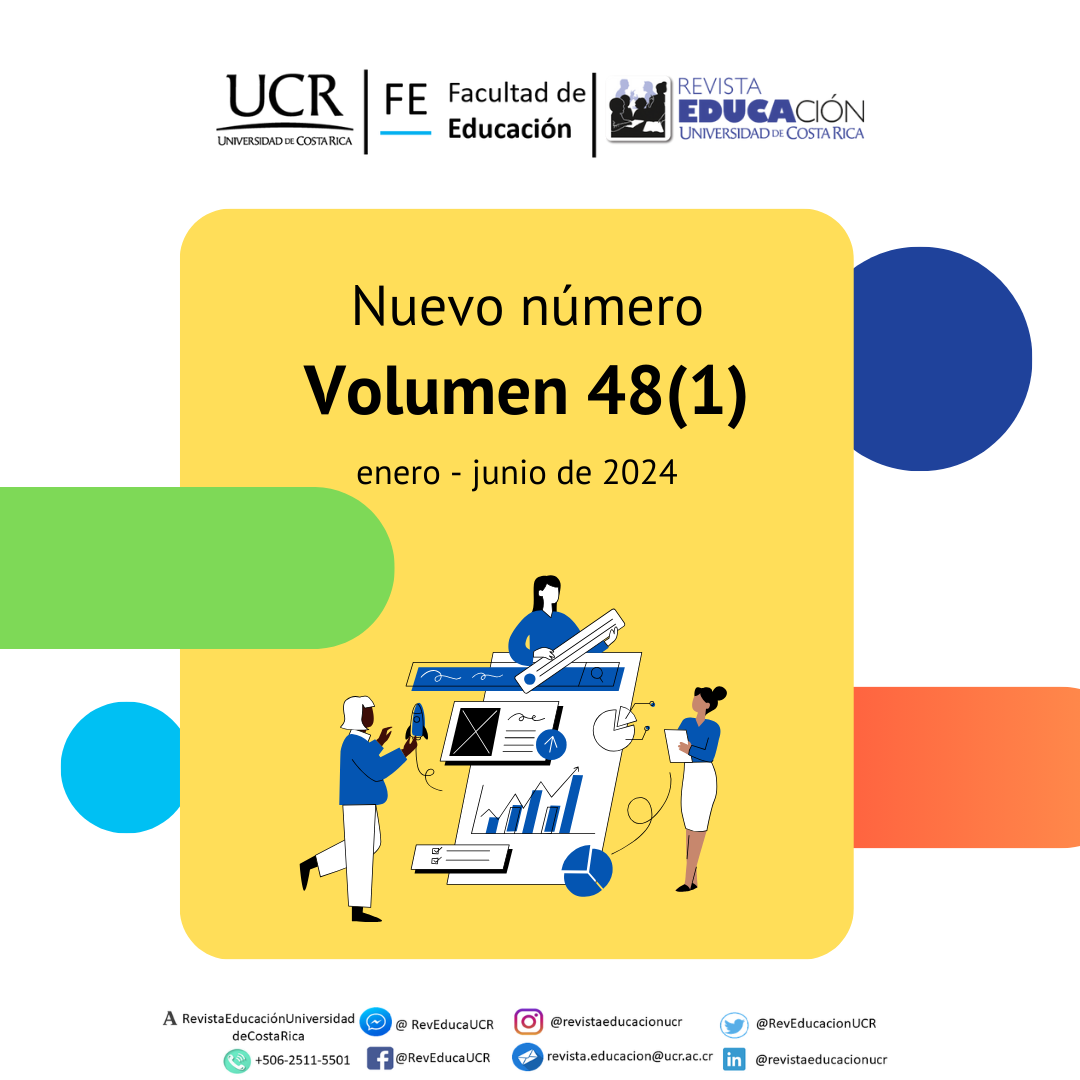Abstract
This article discloses the results of an investigation whose objective was to analyze the effects of planning as a relevant part of self-regulation in the learning processes of secondary school students in the rural and urban sectors of Colombia. The research approach was mixed, which implied the collection and systematization of quantitative and qualitative data, as well as their association and analysis. Moreover, the investigators collected the data through instruments such as a questionnaire and a semi-structured interview, in which they used a focus group technique. These instruments were applied to 307 students and 71 educators from ten educational institutions from different departments of Colombia. In addition, the authors achieved data systematization through techniques such as open and axial coding in categorical analysis matrices. The analysis linked relevant methodological procedures such as identification of recurrences, coincidences, and trends; labeling and prioritization of emerging and final findings; and theoretical triangulation. The results show that although self-regulation consists of a capacity developed in the students, the teacher is decisive in awakening said capacity. It is the educator who must know what are the transversal, technological, methodological, and pedagogical components that each student requires according to their learning styles to actively empower and motivate themselves in everything that involves self-controlled planning of the development of the task. Therefore, teachers must recognize these components and thus be able to act accordingly and generate teaching-learning strategies, as well as educational environments where the students are the main actors who analyze and establish the most suitable tools, actions, and work routes for successfully facing their academic process.
References
Agudelo-Badillo, M., Acevedo-Quitián, L., Mejía-Loaiza, E. y Mahecha-Escobar, J. (2022). Expectativas de resultado y su importancia en el aprendizaje de estudiantes de educación media. Paideia Surcolombiana, 27, 91-102. https://doi.org/10.25054/01240307.3320
Bandura, A. (1986). Social foundations of thought and action: A social cognitive theory [Fundamentos sociales del pensamiento y la acción: una teoría cognitiva social]. Prentice-Hall, Englewood Cliffs.
Barreto-Trujillo, F. J. y Álvarez-Bermúdez, J. (2020). Estrategias de autorregulación del aprendizaje y rendimiento académico en estudiantes de bachillerato. Revista de Estudios e Investigación en Psicología y Educación, 7(2), 184-193. https://doi.org/10.17979/reipe.2020.7.2.6570
Escobar-Pérez, J. y Cuervo-Martínez, Á. (2008). Validez de contenido y juicio de expertos: una aproximación a su utilización. Avances en medición, 6(1), 27-36. https://www.humanas.unal.edu.co/lab_psicometria/application/files/9416/0463/3548/Vol_6._Articulo3_Juicio_de_expertos_27-36.pdf
Font, C. M., Badia, M. C., Muntada, M. C., Muñoz, M. P. y Cabaní, M. L. (1994). Estrategias de enseñanza y aprendizaje: Formación del profesorado y aplicación en la escuela (Vol. 112). Graó.
Gaxiola-Romero, J.C., Gaxiola-Villa, E., Corral-Frías, N.S. y Escobedo-Hernández, P. (2020). Positive learning environment, academic engagement and self-regulated learning in high school students [Ambiente de aprendizaje positivo, compromiso académico y aprendizaje autorregulado en estudiantes de secundaria]. Acta Colombiana de Psicología, 23(2), 267-288. http://www.doi.org/10.14718/ACP.2020.23.2.11
Hernández, C. R. (2014). La investigación cualitativa a través de entrevistas: Su análisis mediante la teoría fundamentada. Cuestiones Pedagógicas, 23, 187-210. http://institucional.us.es/revistas/cuestiones/23/Mis_5.pdf
Hernández, R., Fernández, C. y Baptista, P. (2006). Metodología de la investigación (4a ed.). McGraw-Hill http://187.191.86.244/rceis/registro/Metodolog%C3%ADa%20de%20la%20Investigaci%C3%B3n%20SAMPIERI.pdf
Hernández, R., Fernández, C. y Baptista, P. (2014). Metodología de la investigación (6a. ed.). McGraw-Hill.
Hernández, S. y Mendoza, T. C. (2018). Metodología de la investigación: rutas cuantitativa, cualitativa y mixta. McGraw-Hill.
Janesick, V. J. (1998). Ejercicios de "estiramiento" para investigadores cualitativos (4a ed.). Publicaciones de salvia.
López, O., Sanabria, L. B. y Buitrago, N. C. (2018). Efecto diferencial de un andamiaje metacognitivo sobre la autorregulación y el logro de aprendizaje en un ambiente de aprendizaje combinado. Tecné, Episteme y Didaxis: TED, (44). http://dx.doi.org/10.17227/ted.num44-8988
Montero, I. y De Dios, M. (2004). Sobre la obra de Paul R. Pintrich: la autorregulación de los procesos cognitivos y motivacionales en el contexto educativo. Revista electrónica de investigación en psicología de la educación, 2(3), 189-196. https://www.redalyc.org/pdf/2931/293152878001.pdf#page=34
Organización para la Cooperación y el Desarrollo Económicos - OCDE (2019). El trabajo de la OCDE sobre Educación y Competencias. https://www.oecd.org/education/El-trabajo-de-la-ocde-sobre-educacion-y-competencias.pdf
Ortiz-Saavedra, B. D. (2019). Construcción y validación de una escala para medir estrategias usadas en el aprendizaje autorregulado en estudiantes de bachillerato. Psicogente, 23(43), 121-143. https://www.redalyc.org/journal/4975/497570226007/html/
Oviedo, P. Y., Morales, F., Conejo, F. J. y Mahecha, J. C. (2020). Incidencia de los aspectos socioculturales en la autorregulación del aprendizaje y el rendimiento académico en estudiantes de la básica secundaria. Revista Boletín Redipe, 9(12), 111-126. https://doi.org/10.36260/rbr.v9i12.1139
Panadero, E. y Alonso-Tapia, J. (2014a) ¿Cómo autorregulan nuestros alumnos? Revisión del modelo cíclico de Zimmerman sobre autorregulación del aprendizaje. Anales de psicología, 30(2), 450-462. http://dx.doi.org/10.6018/analesps.30.2.167221
Panadero, E. y Alonso-Tapia, J. (2014b). Teorías de autorregulación educativa: una comparación y reflexión teórica. Psicología Educativa, 20(1), 11-22. https://doi.org/10.1016/j.pse.2014.05.002
Pintrich, P. R., Smith, D. A., García, T. y Mckeachie, W. J. (1991). A manual for the use of the motivational strategies for learning questionnaire (MSLQ) [Un manual para el uso del cuestionario de estrategias motivacionales para el aprendizaje (MSLQ)]. NCRIPTAL, the University of Michigan.
San Martín, D. (2014). Teoría fundamentada y Atlas.ti: recursos metodológicos para la investigación educativa. Revista Electrónica de Investigación Educativa, 16(1). https://redie.uabc.mx/redie/article/view/727/891#:~:text=La%20codificaci%C3%B3n%20axial%20es%20el,en%20cuenta%20que%20%E2%80%9Cuna%20categor%C3%ADa
Schunk, D. H. (2012). Teorías del aprendizaje una perspectiva educativa sexta edición. Pearson.
Torrano, F. y Soria, M. (2016). Una aproximación al aprendizaje autorregulado en alumnos de educación secundaria. Contextos Educativos. Revista de Educación, 1, 97-115. https://doi.org/10.18172/con.2838
Vives-Varela, T., Durán-Cárdenas, C., Varela-Ruíz, M., & Fortoul van der Goes, T. (2014). La autorregulación en el aprendizaje, la luz de un faro en el mar. Investigación en Educación Médica, 3(9), 34-39. https://www.redalyc.org/pdf/3497/349733231006.pdf
Zimmerman, B.J. (2001). Theories of self-regulated learning and academic achievement: An overview and analysis [Teorías del aprendizaje autorregulado y el rendimiento académico: una visión general y un análisis]. En B. J. Zimmerman y D. H. Schunk (Eds.), Self-regulated learning and academic achievement (Second ed., pp. 1-37). New York: Lawrence Erlbaum Associates. https://www.taylorfrancis.com/books/edit/10.4324/9781410601032/self-regulated-learning-academic-achievement-barry-zimmerman-dale-schunk?refId=a40a28e6-a5d0-483d-9b7d-57d3496ea1f6&context=ubx
Comments

This work is licensed under a Creative Commons Attribution-NonCommercial-NoDerivatives 3.0 Unported License.
Copyright (c) 2023 Revista Educación - Journal of Education



